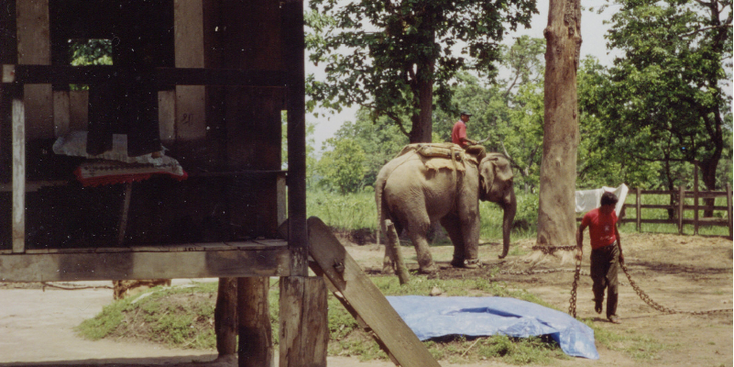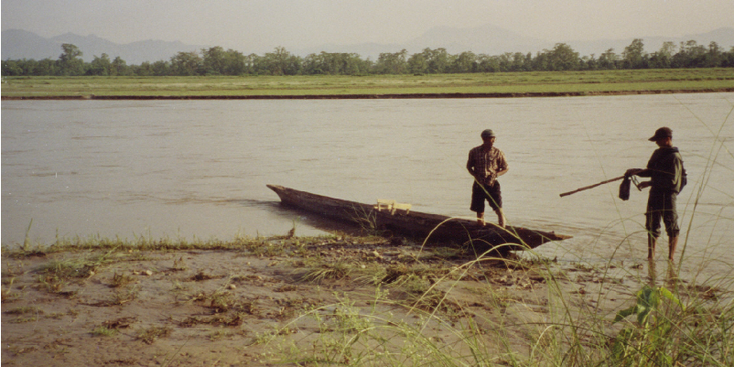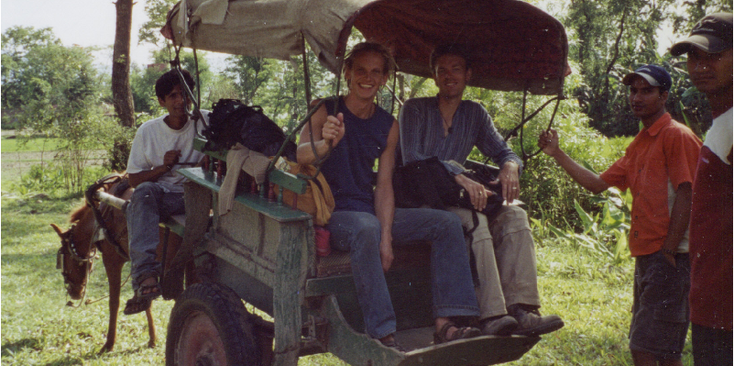Chitwan National Park (Sauraha)
Travel Stories - Nepal

introduction

After my almost 2 weeks long trek through the Annapurna mountains I left Pokhara in the morning and traveled east by bus. I arrived by bus in Tadi Bazaar which is along the main road between the two only real cities of Nepal and arranged a bicycle rickshaw to bring me further into the Terai area. The rain came suddenly down in the buckets and my driver, all my stuff and I got soaking wet.
Luckily we arrived in the village of Sauraka. I checked into my intended hostel, ate at a small eatery and walked - still in the rain - to the information center for more info on the national park. In the afternoon it cleared up and I walked through the village which is not more than a few muddy streets. I became acquainted with the village-rhinoceros that is roaming freely here. I heard that the animal came here as an orphan and is raised by the local population as far as possible.
He steals things from the market and every stall-owner knows him and has a stick to chase him away. It’s possible to embrace him and when I grab him I feel the shields and scales of his skin shift - a remarkable and unique phenomenon of this prehistoric animal. Of course I am on my guard, but the already grown rhino baby doesn’t care. I'm curious what they are going to do with him when he is really grown up and actually life-threatening in a village like this. I sit on the terrace, enjoy the beautiful weather and then go back to my lodge where I will pack my bag for tomorrow.

jungle trip
At 6 o'clock in the morning I'm gnawing my breakfast away at my hut and then walk to the information center where my two guides stand are ready. Apparently, just the three of us are entering the national park. We walk to the Rapti river and canoeing to the other side. Chitwan is the oldest park in the country and dates back to 1973.
By that time this was the only piece of jungle left (the rest had become agricultural land in Nepal) and the number of (indian) rhinos had fallen to 100 and the tiger population to 20. Before that time the area, the lowlands of Terai was a popular hunting ground of British and Nepalese aristocracy. People were taken care of elsewhere and since then the animal kingdom has increased explosively. For example, the rhinoceros numbers would have grown to over 600 and the Bengal tiger to over 100. In 1984 the park was declared world heritage and the park can be counted among the most diverse in Asia rich in unique flora and fauna.

We start our walking tour - with a guide in front of me and one behind me - through the jungle of Nepal. It's quite scary to walk between trees and bushes, where a tiger, leopard, elephant or bear might come out to rip us apart. The scrub is high and unfortunately we see few large animals. Chitwan has a lot of water (and therefore a lot of malaria mosquitoes) and we arrive at a piece of river where we quickly spot a number of crocodiles lying on some sandbanks.
The sweat gushes from every pore of my body and I fear that my anti-mosquito spray doesn’t help me anymore at this point. Luckily I have a lot of water with me. We walk along the river with its high reed collars to the "Limital" lake. We now see many deer, monkeys in the trees and in the distance some elephants. We also spot many beautiful birds. It is lunchtime and we are sitting together in a kind of watchtower when we suddenly see two rhinos in the high reeds. It turns out to be an adult female with her pup and we can spot them very well from up here. And it’s safe too.
We stay for a while and decide to go to the crocodile breeding farm. It is already starting to get dawn when we cross the river hungry and we check into a sort of lodge with a number of mud huts. This is Kasara. We eat together and then I retire to my own cabin. It was a long day today.
Elephant breeding center

At 6:15 am breakfast is served before I collect my stuff and take the bus to Bharatpur. From there the bus continues to Tadi Bazaar where I take a bicycle rickshaw to Chitrasaki. The last 3.5 km I walk back to my hostel in Sauraha. The circle is complete and I’m very happy to be back. I meet another tourist and we decide to have a bit together.
Then in the afternoon we rent a bike with the three of us (we meet another girl) and visit the elephant breeding center which is located about 3 km west of Sauhara. It is best to visit in the afternoon as the elephants will sometimes roam around in the forest.
We can see the little ones and walk around and take some pictures with them. Then we take back the boat and pick up our bikes again. The next day I would arrange a horse and carriage with the Dutch boy to take us to the bus station. We look once again at the rice fields and the old farmhouses and mud houses - we are on our way to the capital Kathmandu.

tips & advice (2004)

Sauhara has no bus station; you will have to take a bus from Tadi Bazaar (6km) or Chitrasali (3km) which are both north of Sauhara. Lodges in Sauhara can arrange (bus) tickets but you can also go to the bus stations themselves. From there you can travel to either Kathmandu or Pokhara. With horse- and wagon you can drive to the bus stations.
Chitrasali - Kathmandu: a bus leaves at 9:30 from Chitrasali to Kathmandu; this arrives around 17:00. An express bus costs 450 R where a regular bus costs about 150 to 200 Rs.

-
Name: Tharu lodge
Address: Sauhara (west side)
Price: 200 Rs (cottage with private toilet / shower)
Phone nr. : 580055
Content:
This lodge is secluded yet close to the action of Sauraha if you can and may speak of it. Tharu is located on a mud path on the west side of the hamlet between the Rapti river and the road to the elephant center. The spacious hostel has cottages with / without private toilet / shower, a reasonable large garden and public areas overlooking the river.
There are mud huts but also a few upgraded stone cottages where you can stay. It is a hippie-like relaxed place.

see also:
LANDEN:
EUROPA:
Albanië * België * Bosnië-Herzegovina * Bulgarije * Denemarken * Duitsland * Engeland * Estland * Finland * Frankrijk * Griekenland * Hongarije * (Noord) Ierland * Italië * Kosovo * Kroatië * Letland * Litouwen * Luxemburg * Macedonië * Malta * Montenegro * NEDERLAND * Oekraïne * Oostenrijk * Polen * Portugal * Roemenië * Rusland * Schotland * Servië * Slovenië * Slowakije * Spanje * Tsjechië * Turkije * Zweden
NOORD EN CENTRAAL-AMERIKA:
Chili * Costa Rica * Cuba * Guatemala * Mexico * Nicaragua * Panama * Verenigde Staten
ZUID-AMERIKA:
Argentinië * Bolivia * Brazilië * Colombia * Ecuador * Peru
AFRIKA:
Botswana * Burkina Faso * Egypte * Ethiopië * Ghana * Kenia * Mali * Marokko * Namibië * Oeganda * Senegal * Tanzania * Tunesië * Zuid-Afrika
MIDDEN-OOSTEN:
Iran * Israël * Jordanië * V.A.E.
AZIE:
Armenië * Cambodja * China * Filipijnen * Georgië * India * Indonesië * Japan * Kirgizië * Laos * Maleisië * Mongolië * Myanmar * Nepal * Oezbekistan * Singapore * Sri Lanka * Thailand * Vietnam
OCEANIE:
Voor meer reisfoto's kijk op www.instagram.com/cheapskatetravel.nl:
© Cheapskatetravel.nl; 2018 (all rights reserved)

